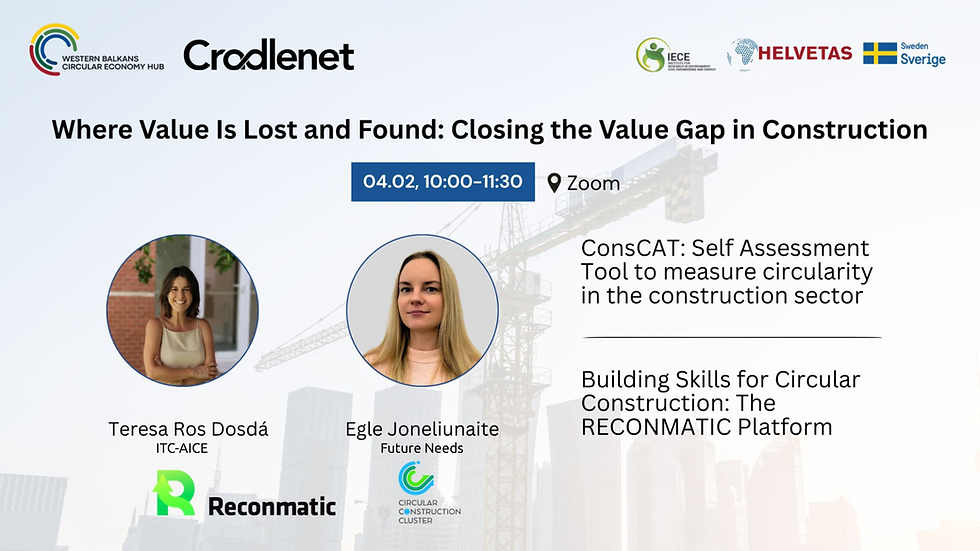RECONMATIC Open Day in Spain: Driving Circular Construction through Innovation and Collaboration
- Mar 20, 2025
- 3 min read
On March 13, 2025, the RECONMATIC project held its Open Day at the European Commission Representation in Spain, in Madrid. The event focused on sharing knowledge and showcasing practical solutions for one of the construction sector’s biggest challenges: improving the sustainability and efficiency of construction and demolition waste (CDW) management.
As the industry evolves towards more circular models, RECONMATIC collaborates in developing digital and automated tools that make CDW management smarter across the entire building lifecycle - from planning and design to demolition, reuse, and recycling.
An Exchange of Perspectives, Solutions, and Practice
The event brought together a diverse group of participants, including professionals from the construction industry, public sector representatives, academics, and European institutions. It created a space for meaningful dialogue between technical experts, innovators, and decision-makers committed to a more circular built environment.
The Open Day was structured around three thematic blocks:
1. Challenges of Circularity in Construction
This opening block addressed systemic challenges that hinder the adoption of circular practices in construction. Topics included the fragmentation of data and metrics, the disconnect between European policy and local implementation, and the pressing need to reduce the sector’s material footprint.
The session highlighted the importance of shifting from linear to circular models, the role of cities as changemakers, and the added value of collaborative approaches across Europe.
Speakers included:
Alfons Ventura – “The challenge of reducing the material footprint in the construction sector”
Jaime Moreno Juez – “VALREC and VALDESC: Success stories in CDW valorisation”
Helen Dugmore – “Cities leading the way toward circular construction”
Sonia Marín Cortés – “ICEBERG Project: Circular economy applied to construction materials”
The block concluded with a dynamic panel discussion moderated by Mónica Vicent.
2. Sector Experiences
The second block provided a grounded view of circularity in action. Through real-world case studies, speakers shared their insights on implementing circular strategies in construction companies, large-scale urban planning projects, and recycling operations.
Key topics included the development of circular asphalt mixes, the integration of circularity in urban transformation processes, and the use of life cycle assessment (LCA) methodologies to support decision-making.
Speakers included:
Miryam Bellido – “Circular bituminous mixes”
Miguel González Colino – “Circularity in Madrid Nuevo Norte”
Francisco Javier Llorente – “CDW management and recycled aggregates”
Iñaki Alonso – “LCA in Natural District projects”
The panel was moderated by Carmen Devesa, fostering an interactive exchange of perspectives.
3. Automated Solutions from the RECONMATIC Project
The final block spotlighted the core innovations being developed within RECONMATIC. These include digital platforms for pre-demolition audits, waste flow prediction, material mapping, and integration with BIM systems—all aimed at streamlining CDW management and enabling circular decision-making.
The speakers presented the project’s demonstrators and discussed how digitalisation can significantly improve coordination and traceability across the construction value chain. The solutions are being tested in pilot sites and are designed to be adaptable to different national contexts.
Speakers included:
Mónica Vicent – “RECONMATIC Demonstrators”
Inés Díez Ortíz – “Life-cycle perspective on CDW management”
The session was facilitated by Maria Isabel De La Cruz Luis, who encouraged dialogue around practical implementation.
Collaboration at the Core
The event was led and organised by ICATALIST, in close collaboration with Spanish RECONMATIC partners: AEICE, ITC, RECSO, and Tecnalia. With participation from the European Commission and a range of local and international stakeholders, the event underscored the value of interdisciplinary and cross-border collaboration in accelerating the shift toward a circular construction sector.














